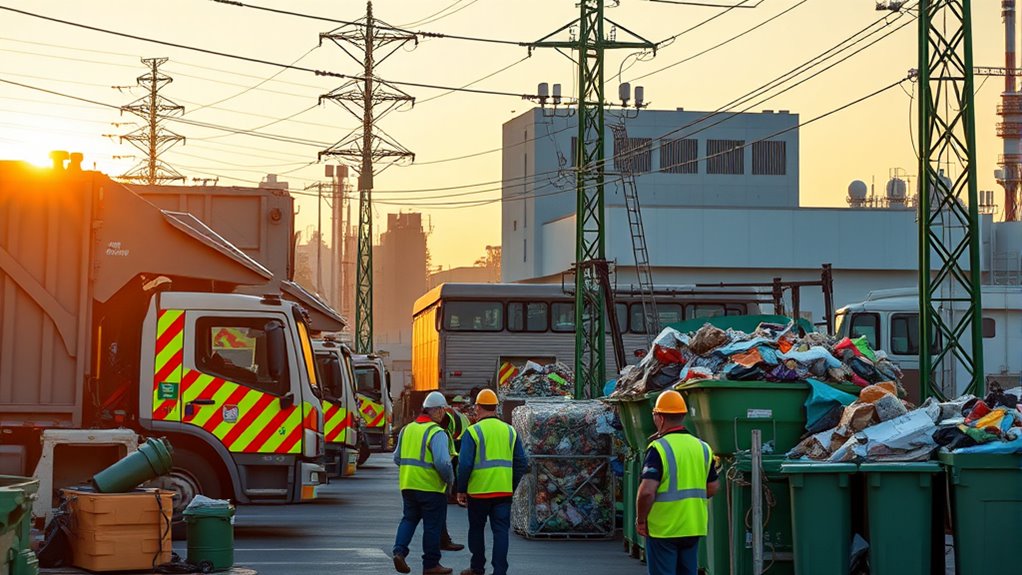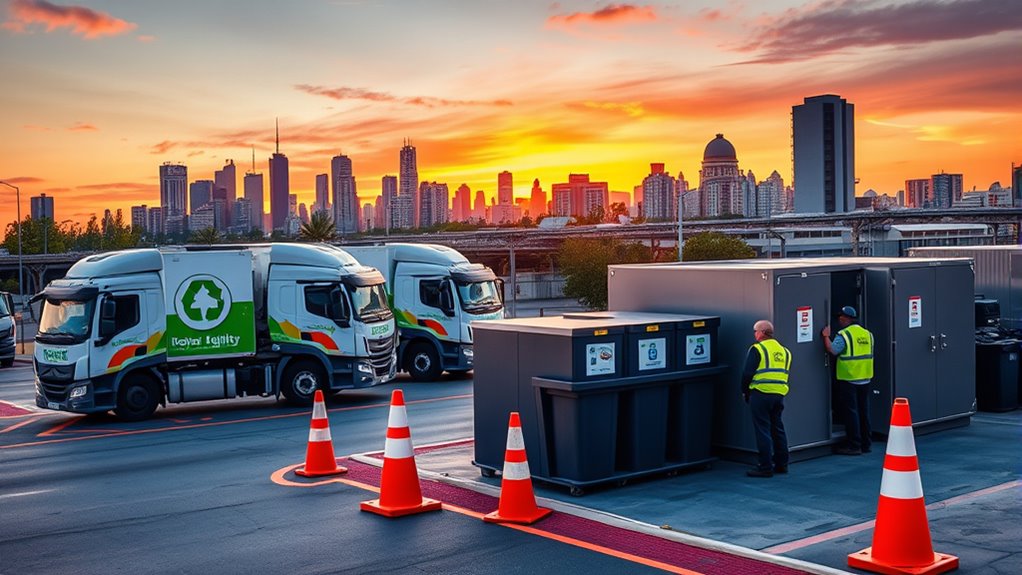Partnering with your local utility simplifies hazardous waste disposal by leveraging their expertise, specialized infrastructure, and established disposal channels. They guarantee compliance with safety regulations, reduce legal risks, and improve safety for your staff and community. Utilities can also organize community collection events and provide accessible drop-off points, promoting responsible waste management. By working together, you strengthen environmental protections and streamline your waste processes. Keep exploring to discover how such partnerships can maximize your waste disposal efforts even further.
Key Takeaways
- Partnering with utilities provides access to trained personnel and specialized infrastructure for safe hazardous waste disposal.
- Utilities facilitate community collection events and drop-off points, making hazardous waste disposal more accessible.
- Collaborations help organizations comply with environmental regulations and reduce legal liabilities.
- Utilities’ expertise ensures proper handling, storage, and disposal, minimizing risks to public health and the environment.
- Ongoing partnerships support process improvements, safety standards, and sustainable waste management practices.

Handling hazardous waste is another critical aspect where partnerships prove invaluable. Hazardous waste demands specialized handling, storage, and disposal procedures to prevent harm to people and the environment. Local utilities often have trained personnel and proper disposal channels for these dangerous materials, which individual organizations might lack. By partnering with them, you minimize risks and ensure compliance with strict regulations. This collaboration not only safeguards public health but also protects your organization from legal liabilities and potential fines. Moreover, utilities can help you develop safe collection events or drop-off points specifically for hazardous waste, making it easier for your community or employees to dispose of dangerous materials responsibly. Implementing repeatable tests and procedures can further improve safety and efficiency in waste management processes.
Frequently Asked Questions
What Are the Typical Costs Involved in Forming a Partnership?
When forming a partnership, you’ll need to conduct a thorough cost analysis to understand expenses involved. Typical costs include setup fees, infrastructure investments, and ongoing operational expenses. You’ll also evaluate different partnership models to find the most cost-effective approach. Keep in mind, costs vary based on scope and scale, so carefully compare proposals to guarantee you’re making a financially sound decision that benefits both parties.
How Are Environmental Regulations Managed Within These Partnerships?
You might worry about maneuvering complex environmental regulations, but partnerships streamline this process. You’ll work closely with utility providers to guarantee environmental compliance and meet regulatory oversight standards. Together, you develop clear protocols, monitor waste management practices, and stay updated on policy changes. This collaboration helps you avoid penalties, reduces risks, and demonstrates your commitment to sustainability, making compliance manageable and more effective within your waste disposal efforts.
What Are the Common Challenges Faced During Implementation?
You face challenges like securing community engagement and integrating new technology. Gaining community support requires transparent communication and addressing concerns, which can slow progress. Meanwhile, technology integration demands training and infrastructure upgrades, often causing delays. Balancing these aspects is tough, but focusing on clear communication and phased implementation helps. Overcoming these challenges strengthens the partnership, ensuring more effective waste disposal solutions aligned with environmental goals.
How Is Data Sharing Handled Between Entities?
Ever wonder how data sharing stays secure amid collaboration? You handle it by establishing clear protocols that prioritize data privacy, ensuring sensitive info isn’t exposed. Technology integration plays a crucial role, enabling seamless communication between systems while safeguarding data. You use encrypted channels and access controls to prevent breaches. This way, your partnership runs smoothly, fostering trust and efficiency without risking sensitive information. Isn’t that the key to successful collaboration?
What Are the Long-Term Benefits for Local Utilities?
You benefit long-term from waste disposal partnerships by advancing sustainability initiatives that reduce environmental impact and operational costs. These collaborations foster stronger community engagement, showing your commitment to responsible waste management. Over time, you’ll see improved public trust and support, plus innovative solutions that enhance efficiency. Such partnerships help you build resilient, eco-friendly systems, ensuring a cleaner environment for your community while strengthening your utility’s reputation and long-term sustainability.
Conclusion
Forming partnerships with local utilities opens a path toward more sustainable waste management. By collaborating closely, you can navigate the complexities of disposal with greater ease and elegance, turning challenges into opportunities for innovation. These alliances serve as a gentle reminder that shared efforts often lead to more refined and effective solutions. Embrace these connections, and you’ll find that the journey toward responsible waste disposal becomes not only achievable but also more harmonious and forward-looking.









